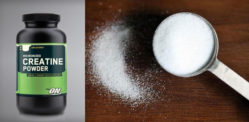Think of creatine as an extra fuel tank for your muscles.
Are you on a quest to enhance your fitness regime and lead a healthier lifestyle?
Creatine, a popular supplement in the wellness community, might just be the missing piece in your puzzle.
This powerhouse supplement has been the subject of extensive research and discussion, especially for its role in improving exercise performance and muscle strength.
But, like any supplement, it comes with its own set of pros and cons.
Here’s everything you need to know about creatine, from its benefits to its side effects, to help you decide if it’s the right addition to your fitness journey.
Strength Gains
 Are you ready to take your strength training to the next level?
Are you ready to take your strength training to the next level?
Meet creatine, your new best friend on this journey.
This dynamic supplement has earned its stripes in the fitness world for its remarkable ability to boost muscle strength and endurance.
Imagine being able to push beyond your limits during workouts, achieving more than you thought possible. That’s the power of creatine.
When you’re lifting weights or engaging in any high-intensity training, your muscles rely on ATP (adenosine triphosphate) as their primary source of energy.
This is where creatine comes into play. It works by increasing the availability of ATP, essentially providing your muscles with the energy needed to perform those extra reps and sets.
These additional efforts are crucial for muscle development and strength gains, acting as the stepping stones towards achieving your fitness goals.
Think of creatine as an extra fuel tank for your muscles.
Just when you think you’re about to hit empty, creatine gives you that much-needed energy boost, allowing you to continue pushing forward.
Water Weight
 Stepping onto the scale after starting your creatine journey might surprise you with a few extra pounds, but there’s no need for alarm.
Stepping onto the scale after starting your creatine journey might surprise you with a few extra pounds, but there’s no need for alarm.
This phenomenon is a natural and expected part of the creatine experience, primarily attributed to water weight gain.
Creatine has a unique ability to draw water into your muscle cells, a process known as cell volumization.
This not only enhances the size and appearance of your muscles but plays a pivotal role in their growth and repair mechanisms.
The increased water content within the muscle cells creates an environment that is conducive to muscle recovery and synthesis, laying the groundwork for strength gains and muscle development.
For individuals focused on weight loss or maintaining a certain weight, witnessing an uptick on the scale can initially be disheartening.
However, it’s crucial to understand that this water weight is not indicative of fat gain but rather an essential step towards achieving a more muscular and powerful physique.
The additional water in the muscles can also contribute to improved performance during workouts, allowing for longer, more intense training sessions.
Moreover, this water retention is typically temporary.
As your body adjusts to the creatine supplementation, the initial bloating experienced by some individuals tends to subside.
Brain Booster
 When we think of creatine, the immediate association is with muscle power, endurance, and overall athletic performance.
When we think of creatine, the immediate association is with muscle power, endurance, and overall athletic performance.
However, the scope of creatine’s benefits stretches far beyond the confines of physical fitness, reaching into the cognitive realms of our health.
This remarkable supplement serves as a cognitive enhancer, shining a light on its potential to bolster brain function alongside muscle strength.
Research has illuminated the fascinating role of creatine in cognitive enhancement, particularly highlighting its impact on memory and reasoning skills.
This is especially pronounced in individuals such as vegetarians or those with naturally lower levels of creatine, who may not receive ample amounts from dietary sources.
Creatine supplementation steps in as a critical ally, fostering an environment where cognitive functions can flourish.
The secret behind creatine’s cognitive prowess lies in its support of ATP production.
ATP is not only the energy currency of our muscles but also of our brain cells.
By bolstering ATP availability, creatine ensures that our brain cells have the necessary energy to perform optimally.
This energy boost is crucial for enhancing memory recall, speeding up reasoning skills, and improving overall cognitive processing.
In essence, creatine feeds the brain the energy it needs to thrive, much like it fuels muscles during intense workouts.
Stick with the Powder
 When you invest time and effort into your fitness routine, you want to ensure you’re getting the most out of every supplement you take.
When you invest time and effort into your fitness routine, you want to ensure you’re getting the most out of every supplement you take.
This is where the stability of creatine monohydrate powder truly shines.
Liquid forms of creatine can degrade over time, losing potency and effectiveness.
In contrast, the powder form remains stable, ensuring that each dose delivers the full strength of its benefits.
This stability means you can trust that your supplement will perform consistently, workout after workout.
Choosing the right form of creatine is crucial for maximising your workout results and achieving your fitness goals.
Creatine monohydrate powder offers a combination of research-backed benefits, cost-effectiveness, and stability that other forms simply can’t match.
By sticking with the powder, you’re not just choosing a supplement; you’re choosing a proven path to strength, endurance, and overall physical enhancement.
Whether you’re lifting weights, sprinting, or engaging in any form of high-intensity training, creatine monohydrate powder is your ally in the quest for peak performance.
Strategic Timing
 The debate on the best time to take creatine has been ongoing, but emerging research and expert consensus point towards two key windows: pre-workout and post-workout.
The debate on the best time to take creatine has been ongoing, but emerging research and expert consensus point towards two key windows: pre-workout and post-workout.
Each of these timings offers unique benefits that can cater to different goals and preferences.
Taking creatine about 30 minutes before your workout session primes your muscles with an energy boost that can enhance your performance.
This timing leverages creatine’s ability to increase ATP production, the primary energy molecule for short bursts of power and strength.
By saturating your muscles with creatine before you hit the weights, you’re essentially ensuring that they have the fuel needed to push through those last, often most challenging, reps and sets.
The period immediately following your workout is when your muscles are most receptive to nutrients, thanks to the heightened blood flow and the body’s natural shift towards repair and growth.
Introducing creatine during this window can expedite its delivery to your muscle cells, where it can aid in recovery and growth.
The post-workout phase is also when your body’s insulin sensitivity is at its peak, making it an ideal time to combine creatine with a carbohydrate-rich snack or meal.
This combination can spike insulin levels, which in turn helps shuttle creatine more efficiently into muscle cells, enhancing its absorption and effectiveness.
Creatine is a supplement that can enhance your strength, cognitive function, and overall fitness.
By understanding how to leverage its benefits effectively, you can make creatine a valuable ally in your health and fitness regimen.
Remember, as with any supplement, it’s essential to consult with a healthcare professional before starting creatine, especially if you have underlying health conditions.
Now, armed with these insights, you’re ready to harness the full power of creatine and elevate your fitness journey to new heights.






























































